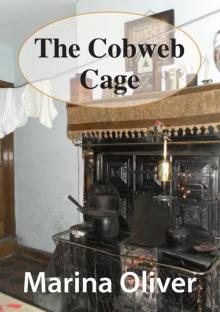- Home
- Marina Oliver
Scandal at the Dower House Page 3
Scandal at the Dower House Read online
Page 3
Eventually he was gone and Catarina turned to Lord Brooke.
‘Come inside, my lord, and take a glass of wine. What brings you back now? The Dower House is almost ready for me; I will be moving in next week.’
‘It was about some other houses I came. One of my reasons. I have discovered your late husband was contemplating removing the villagers from their present cottages to a point a mile away. He intended, I understand, to provide himself with a better view by so doing. I came to stop it.’
‘Stop it? But why?’
‘I didn’t know your husband, but from all I have heard he was a good landlord, so I find it desp— disappointing, to hear he is dispossessing the villagers of their homes.’
‘Have you seen those homes?’ Catarina asked.
‘No, except for seeing their roofs from the house.’
‘Those pretty thatched roofs are full of vermin, and the nearest water, apart from the river, is half a mile away. They are floored with earth, low lying, near the marsh, and very damp in winter. Occasionally they are flooded. A dozen houses share one privy.’
‘Those things can be improved and I mean to see to it. I do not wish to criticize Walter, but I would have thought, as he was reputed a good landlord, that he would have done something about it.’
By now Catarina was fuming. ‘He did do something about it! Those hovels are a disgrace. You will find the villagers are only too anxious to move to the new cottages Walter has caused to be built near the church. Good, stone cottages, with roofs of slate, each with its own privy, and a well within a few yards.’
‘Such improvements could be achieved where they are at the moment. Don’t the people work on the farms, or in the house? Will they appreciate a long walk, at least a mile, to and from work?’
‘They will be closer to their friends and families who already live in the cottages Walter has been building for the past eight years. They will be close to the church, and there are shops in the village. They are closer to the commons and their animals. And to their taps.’
‘Taps?’
‘The strips in the common fields. Ask them, my lord, and listen to what they want before you prevent them from acquiring better houses at the same rents as before!’
The estate room, when Nicholas went into it, was untidy, with papers scattered all over the desk and others lying on the floor. There seemed no kind of order. He sat behind the desk and was reading some of the papers when the agent, a young man of his own age, rushed into the room.
‘My lord! You should have told me you meant to visit; I would have had it all tidy for you.’
‘Should have told you?’ Nicholas drawled, his tone icy.
The other man’s eyes widened and he swallowed hard.
‘I-I only meant, well, that I’d have been prepared for you!’
‘It should be tidy at all times. You might then even find it possible to hide your depredations of the estate.’
‘I-I don’t know what you mean, my lord!’
‘No? Then perhaps I had best explain. Your late master was building new houses in the village. You had the task of paying the builders, but I find from comparing the amounts you put in the accounts books and the receipts from the builders that you seem to have been stealing small but steady sums from the late earl and, I presume, from me. I have not been able to compare the books since the funeral, but I intend to.’
‘I must have made an error in calculation, my lord,’ the wretched man said. ‘If you permit me to check them, I will soon discover the mistake.’
‘A systematic cheating is no error. How did you become agent here at Marshington? You are young for such a responsible position.’
‘I’m old enough,’ the man replied, looking frightened. ‘I came when my father died. A year ago, that was. He’d been agent here for many years and the late earl had promised him I would have the position after him.’
‘What did you do before?’
‘I worked for a merchant in Bristol, as a clerk in the counting house.’
‘Then I suggest you apply to have the post back, for I will not permit you to remain in my employment, cheating and lying to me. I will not, of course, be able to give you a reference.’
Nicholas helped Catarina into the curricle and she directed him towards a side path which led towards the cottages. He stole a glance at her to confirm his memory. For some reason he had not been able to forget her. She was truly lovely, though the stark black mourning dress did not flatter her golden skin. Her face was oval, her eyes a golden brown, and her mouth wide and kissable. She seemed to have gained weight since March; her cheeks were fuller, as was her bosom, partially revealed by the lighter gown she wore and visible under the shawl casually draped round her shoulders. He felt a frisson of desire. Why on earth had such a girl married a man so much older? There must have been other suitors apart from Walter, for her money as well as her delicious person, even when she was only sixteen. Recalling Sir Humphrey’s unctuous leave-taking he had an unwelcome thought. Surely Catarina was not contemplating a connection with him? Not with another elderly man. She deserved something better. In any case it was far too soon for her to be contemplating another marriage.
Then he recalled a conversation with Olivia soon after they reached home, when he had agreed to her pleas that she might return to Brooke Court and Miss Shipton for another year. He had, besides, promised that he would find someone other than Lady Keith to sponsor her debut into Society. She had been in a confiding mood, such was her relief.
‘Joanna was expelled,’ she had told him.
‘Expelled? From your seminary? I didn’t know she had been a fellow pupil.’
‘Yes, but she is two years older than I, and we had little in common. She had her own friends. She remembered me, of course, but I don’t think she’d have recalled my name if I had not been with you.’
‘Was she as outspoken there?’
‘Yes; she never cared what she said, but that wasn’t the reason she was expelled.’ Olivia blushed. ‘She was caught climbing out of a storeroom window to meet a young man!’
Somehow that had not surprised Nicholas. All the time they had been at Marshington Grange for Walter’s funeral, Joanna had been flirting, discreetly but with intent, with Jeremy. Was Catarina similarly inclined, another flirt? She had not seemed like that. Had there been some scandal which had induced her guardians to marry her off? It was not unusual for girls to wed straight from the schoolroom, and Walter, though so much older, had been a good match, but from what he had seen of Catarina’s spirit, he would have expected her to protest. Yet she seemed to be encouraging Sir Humphrey.
He pushed aside such distasteful speculations as they came to the first of the cottages. What had looked picturesque from the terrace at the Grange was, close to, rather more squalid. Several cottages had, it appeared, already been demolished, and piles of rubble showed where they had stood. The thatch was old and in dire need of renewing. The wattle and daub walls were pocked with gaps where the mud had fallen away. The window frames sagged, with spaces through which the wind would whistle.
‘These things can be repaired,’ he said to Catarina, as he halted the curricle and took stock of the scene in front of him.
‘Of course, but I must show you the houses in the village and you will see how much better they are.’
‘I deplore the fashion of clearing away whole villages just to improve the prospect from a house.’
‘So do I, if that is the sole reason, and especially if no other suitable provision is made for the villagers. But these people want to move. Ask them yourself.’
She scrambled from the curricle and vanished through a low doorway in the nearest cottage. Nicholas climbed down slowly, handed the reins to his tiger, and wondered whether he was meant to follow.
Before he could decide, Catarina reappeared tugging at the hand of a small, slight, bent old woman who glanced up at him shyly as she tried to curtsy. Several small children followed her out of the house and
stood nearby, joined soon by two more women and an ancient man smoking a foul-smelling pipe which had in it, Nicholas thought, something far more obnoxious than tobacco.
‘Moll, this is the new earl. Tell him why you want to move from this house.’
Moll took a deep breath. ‘Well, surr, it be mortal damp in’t winter. See t’river, it floods in’t winter. An’ we don’t ’ave nowhere ter go, see, can’t, we don’t ’ave more’n the one room.’
Nicholas glanced at the cottages and belatedly realized the thatch came so low it was impossible for there to be an upper storey, even a loft. ‘What do you do,’ he asked, ‘when the houses are flooded?’
‘It don’t often reach wall beds, so we can sleep in’t dry. We just ’as ter wade through it. But it covers fireplace, so we can’t cook. Surr, when will our new cotts be ready? Old Marge went just afore ’is lordship were killed, an’ says it’s ’eaven, so close ter new well an’ all.’
‘Will the new houses be ready soon?’ Nicholas demanded.
‘Before the winter, if you don’t stop the building,’ Catarina told him. ‘And even if you preferred to rebuild here, you would need to find somewhere for these people to go while it’s done. How many still live here, Moll?’
There were three cottages remaining, so when Moll told him there were ten adults and as many children he looked at them again, wondering how on earth so many people fitted into their single rooms.
‘You’d prefer the new houses near the church? Rather than have these rebuilt, with upper floors and more room?’
Moll looked frightened. ‘Oh, surr, you bain’t goin’ ter stop us ’aving our nice new ’ouses? The old earl promised, and we’m lookin’ forward to being close ter them who’ve already gone.’
There was a murmur of agreement from the adults surrounding them.
Nicholas nodded slowly. ‘Very well, I’ll make sure the builders finish your new houses as soon as possible.’
‘Bless you, surr!’
‘Do you want to see the new houses?’ Catarina asked as they drove away.
‘I think not. I really must be getting on. I intended only to make a quick visit to see my agent. I am on my way to Brussels.’
‘You are rejoining the army? Now that the threat from Napoleon seems greater? Is there really going to be more fighting? Sir Humphrey does not think so.’
‘I fear there will be. Perhaps he is trying to reassure you, prevent you from worrying.’
‘He is very considerate.’
Was he? Nicholas ground his teeth.
‘The duke needs all the experienced officers he can find. Jeremy is already there, in Brussels, but so far all he appears to do is go to balls and parties.’
‘Then I wish you good fortune, my lord. My mother’s family in Portugal suffered during the French occupation. Several cousins were killed, either in the fighting, or when the French massacred all the people of Evora.’
‘Do your family live there?’
‘No longer in Evora. The Quinta das Fontes is near Oporto. That is the main estate, though various members of the family have their own houses along the Douro. They are mostly producers of wine.’
‘Which I suppose is how your parents met?’
‘Papa did a lot of business with the family, but her parents were not pleased when he wanted to marry Mama. They had hoped for an alliance with one of the wealthy, well-connected Portuguese families.’
‘When did they die?’
‘Mama was ill for a long time after Joanna’s birth. There is six years between us and several babies were lost before Joanna was born. She was only four when Mama died. Papa died four years later, of a fever he contracted when visiting a vineyard in the Canaries.’
‘And his brother became your guardian?’
Catarina merely nodded. He glanced at her and saw that her lips were pressed firmly together. Though she had talked freely about her parents, she was clearly unwilling to speak of her uncle. Was that because he had forced her into marriage with Walter? All he had heard about Sir Ivor Norton indicated the man was stern and unyielding. His own sons were reputed wild youngsters, though Nicholas barely knew them.
They had reached the Dower House and he helped Catarina to alight.
‘Will you take a glass of wine, my lord? I can offer you some of Papa’s best Madeira.’
‘I must decline; I have a long way to travel. But my thanks for your … guidance over the cottages. By the way, I have dismissed the agent and my own man, Mr Trubshaw, will be arriving to take over. Perhaps you will talk to him? I know he would appreciate it.’
‘Dismissed? But why?’
‘He had been defrauding your husband, falsifying the accounts over the cost of the building materials for the new cottages, and telling me lies. Of all things I most abominate being lied to.’
She clearly wanted to know more, but Nicholas shook his head.
‘I’ll explain another time. I really must leave now.’
He drove away. He did not know what to feel. He was so accustomed to managing his own estates, where no one queried his decisions, that he was a trifle piqued at having had to accept Catarina’s advice. At least he would now have a reliable agent here.
He shrugged, and forced his attention back to the situation in France. Wellington and Napoleon had never met in battle. From all reports many of Napoleon’s former soldiers were flocking to join him, and the allied army was a heterogeneous collection of untrained and inexperienced men. If anyone could mould them into a proper fighting force it was the duke. The sooner he got to Brussels the better.
Two weeks later, Catarina and Rosa, her maid, were in the Dower House putting away Catarina’s gowns.
‘Such a pity you can’t wear colours,’ the maid said. ‘Black doesn’t suit you.’
‘There’s no one to see me,’ Catarina said. ‘I can’t go out in company yet, and I have no wish to.’
‘Sir Humphrey calls almost every day.’
‘He’s been very kind. As one of his lordship’s oldest friends he’s made it his task to look after me.’
Rosa suppressed a smile and Catarina frowned. She knew what her maid, who had been with her since her marriage, thought. Sir Humphrey was a widower, his wife having died six years ago, and his children were all married and living at a distance. He made no secret of the fact he did not enjoy living a bachelor existence. And he had never hidden his admiration for Catarina. Fervently she prayed he would not make her an offer. She had been fond of Walter, but she had no desire to wed another man of his age. She had no desire to remarry at all, whatever romantic notions Rosa had. Perhaps it was her own imminent wedding to the son of one of the tenant farmers that directed her thoughts in such pathways.
They finished putting away the gowns, and Catarina picked up the older, less fashionable ones she had determined to give away. Walter had been a generous husband, and she had more gowns than she would need now. Besides, the Dower House had only four principal bedrooms, all far smaller than hers at the Grange, and there was insufficient room for them all. She would harness the gig and take them to the rectory. Mrs Eade would know who needed clothing, and her sewing circle, made up of the few gentlewomen in the parish, a couple of farmers’ wives, and two favoured shopkeepers, would enjoy using the material and making over the gowns into apparel more suitable for needy villagers.
Rosa packed up the bundle, while Catarina sent Staines to order the gig. Walter’s butler, who had been with the earl for more than thirty years, had insisted he wanted to remain in her service.
‘I’m getting on, my lady, and I can’t be doing with the sort of changes a new owner will want to make. I’d be better suited, much more content, looking after you at the Dower House.’
Touched, she had agreed. With him, Rosa, a cook, kitchen maid, two housemaids and two gardeners, who also looked after her two horses and did odd jobs about the house, she was well served.
She was entering the village just as a mail coach pulled away from the Bear inn. Then she
frowned. Surely that female standing before the inn, a carpet bag at her feet, couldn’t be Joanna? But it was. As soon as her sister saw her she abandoned her bag and ran to meet Catarina.
‘Oh, Cat!’ she cried and burst into tears.
‘Joanna, what on earth’s the matter? Why are you here?’
‘I-I can’t tell you here.’
‘Get in. Let’s collect your luggage. I must take these gowns to Mrs Eade, then we can go home and you can tell me what brings you here, and in such a state. Now dry your eyes.’
Joanna sniffed, employed the handkerchief Catarina offered and tried to calm herself. Fortunately Mrs Eade was out, so Catarina did not have to refuse any offer of refreshment, and half an hour later she was guiding Joanna into the Dower House.
Staines, without being asked, brought a pot of tea and some of Cook’s almond biscuits. Ellen, her cook, was no older than Catarina herself, and she had hesitated before employing her. She had been accustomed to have much older women, plump and comfortable, as cooks, but once Ellen, on a week’s trial, had produced some of her delicious dishes, Catarina had had no more reservations. Ellen seemed to spend all her time reading old receipt books, and told Catarina she had inherited them from her grandmother, who had been cook to gentry.
Joanna tossed her travelling cloak over the back of a chair and curled up in a small ball in one corner of a big sofa. She seemed disinclined to speak and Catarina did not press her. She poured tea for them both. Joanna took the cup with a bleak smile, then she attacked the plate of biscuits and ate voraciously.
‘I had no breakfast,’ she explained. ‘I had to leave in the middle of the night to catch the mail in Bristol.’
‘Does Uncle Ivor know you have come? Has he been unkind to you?’ she added, thinking back to the few months she had herself spent with her uncle’s family between leaving school and marrying Walter.

 Rebel Heart
Rebel Heart Theft of Love
Theft of Love Courtesan of the Saints
Courtesan of the Saints Fatal Slip
Fatal Slip Highwayman's Hazard
Highwayman's Hazard The Cobweb Cage
The Cobweb Cage The Irish Bride
The Irish Bride Apple Blossom Bride
Apple Blossom Bride Scandal at the Dower House
Scandal at the Dower House Eugenie and the Earl
Eugenie and the Earl Her Captive Cavalier
Her Captive Cavalier The Glowing Hours
The Glowing Hours Sibylla and the Privateer
Sibylla and the Privateer The Baron's Bride
The Baron's Bride Player's Wench
Player's Wench Gavotte
Gavotte The Chaperone Bride
The Chaperone Bride A Murdered Earl
A Murdered Earl Charms of a Witch
Charms of a Witch Convict Queen
Convict Queen The Accidental Marriage
The Accidental Marriage